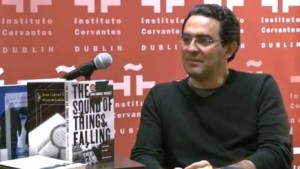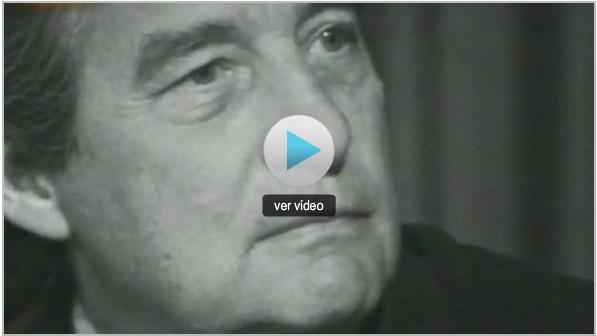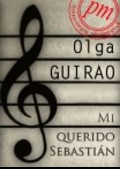Blog del Instituto Cervantes de Dublín
Torre Martello
Diario de un poeta recién casado / Diary of a Newlywed Poet
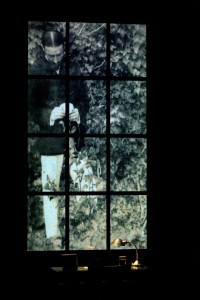 Diario de un poeta recién casado es «una breve guía de amor por tierra, mar y cielo» escrito por el premio Nobel de literatura Juan Ramón Jiménez durante su primer viaje a Nueva York. Este viaje iniciático lo reúne con su musa, Zenobia Camprubí, quien pronto se convertirá en su mujer a pesar de haber rechazado en otras ocasiones las propuestas amorosas del poeta.
Diario de un poeta recién casado es «una breve guía de amor por tierra, mar y cielo» escrito por el premio Nobel de literatura Juan Ramón Jiménez durante su primer viaje a Nueva York. Este viaje iniciático lo reúne con su musa, Zenobia Camprubí, quien pronto se convertirá en su mujer a pesar de haber rechazado en otras ocasiones las propuestas amorosas del poeta.
Juan Ramón Jiménez inaugura con esta obra un mundo nuevo de posibilidades para el verso libre en español, y construye el ritmo de sus poemas inspirándose en los movimientos del mar.
Este Diario es un espectáculo organizado en colaboración con la compañía Teatro de la Abadía, dirigido por el conocido y multipremiado actor José Luis Gómez. En él, «Gómez encarna a un Juan Ramón aislado y solitario, viviendo la cadencia de su verso y la naturaleza única e íntima de cada palabra. Y, sin embargo, todo, el patio de butacas, las paredes del teatro, todo hasta el infinito / se colma de una esencia / inmensa y viva».
El espectáculo tendrá lugar en el histórico Smock Alley Theatre (Boys School). Una ocasión única para aproximarse al texto original en la voz de uno de los mejores actores de la escena teatral española. Una representación que se incluye en las celebraciones del mes de Juan Ramón en el Instituto Cervantes de Dublín, en el que conmemoramos el centenario de la primera publicación de Platero y yo, la obra más universal de Juan Ramón y el texto en español más traducido a nivel mundial después de El Quijote, de Miguel de Cervantes.
¿Dónde? Smock Alley Theatre, Exchange Street Lwr, Temple Bar, Dublin 2
¿Cuándo? El 5 de noviembre a las 7 de la tarde.
Entrada libre hasta cubrir aforo.
Reservas en: reservas.dublin@cervantes.es
Espectáculo en español con sobretítulos en inglés.
Organised by: Instituto Cervantes Dublin in collaboration with Teatro de la Abadía (Madrid)
Nota de prensa de Miriam Abuin (prendub@cervantes.es)
Diary of a Newlywed Poet is “a guidebook to love through the land, the sea and the sky”. Nobel Prize winner Juan Ramón Jiménez writes during his first trip to New York. This initiation journey reunites him with Zenobia Camprubí, soon to become his wife, but who had refused to accept his attentions and courtship in various occasions.
Juan Ramón Jiménez inaugurates with his work a world of possibilities for the free verse in Spanish, and constructs the rhythm in his poems inspired by the movements of the sea.
Diary… is a show organised in collaboration with the prominent theatre company, Teatro de La Abadía, led by renowned actor and director José Luis Gómez. “Gómez incarnates a solitary and isolated Juan Ramón, living on the cadence of his verse and the unique and intimate nature of his words. But, surprisingly enough, everything, the stall, the theatre walls, everything, even the infinite / becomes suffused with an immense / and living essence”. The show will take place in the historic Smock Alley Theatre (Boys School).
This is an exceptional occasion to enjoy and approach the original text in the voice of one of the best actors from the current Spanish theatre scene. Diary… is included in Juan Ramón Jiménez´s Month, a series of events prepared by Instituto Cervantes for the month of November to commemorate the centenary of the first publication of Platero y yo, Juan Ramón Jiménez’s universal work and most translated text from Spanish after Don Quixote.
Location: Smock Alley Theatre, Exchange Street Lwr, Temple Bar, Dublin 2
Date: 5th November
Time: 7pm
Free Admission but limited places available.
Please book your ticket at reservas.dublin@cervantes.es
Languages: Spanish with English surtitles.
Organised by: Instituto Cervantes Dublin in collaboration with Teatro de la Abadía (Madrid)
Press release by: Miriam Abuin (prendub@cervantes.es)
20 escritores de siete países y miles de historias / 20 Writers from Seven Different Countries and Thousands of Stories
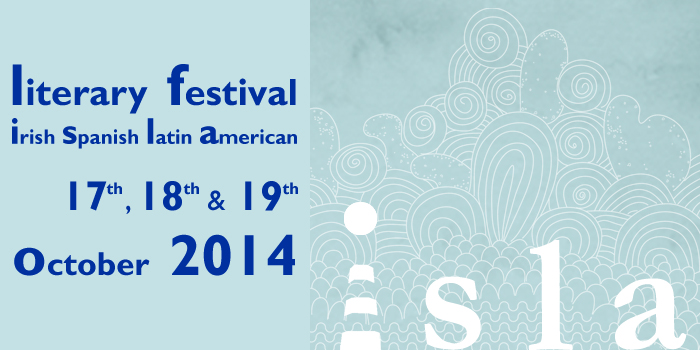
La 3ª edición del Festival Isla de literatura comienza en poco más de una semana. Un festival único en Dublín y en Irlanda. Este año, nuestra «ISLA» (acrónimo de Irish, Spanish and Latin American) recibe la visita de escritores consagrados, prometedores, y la de críticos, traductores y otras personalidades con una fuerte vinculación con el mundo literario de América Latina, España e Irlanda.
John Banville, Premio Príncipe de Asturias 2014, abrirá oficialmente el festival el viernes 17 a las 4 de la tarde y participará en la primera mesa redonda que lleva por título Retratar escribiendo, junto a la vanguardista escritora chilena Diamela Eltit y al multipremiado escritor español José Ovejero. La primera tarde del festival concluirá con el debate «Construyendo identidades» en el que contaremos con la presencia de Donal Ryan, autor de Spinning Heart’s, la poeta y traductora literaria Anamaría Crowe Serrano, y el escritor experimental Christodoulos Makris.
El tema central del sábado, «Nos gustan las historias» comenzará comenzará con la conversación en torno al valor de los cuentos con la presencia de Claire Keegan, el escritor vasco Harkaitz Cano y la poeta irlandesa Mary O’Malley. La segunda mesa redonda del día, «La palabra imprecisa», tendrá como invitados al autor de The Specked People’s, Hugo Hamilton, la poeta gallega Marta Dacosta y el escritor y comunicador irlandés Manchán Magan. Todos ellos abordarán temas como las peculiaridades, ventajas o problemas que supone vivir entre dos o más lenguas. El sábado finalizará con una mesa dedicada a reconocer y repasar el legado literario del gran escritor mexicano Octavio Paz. A esta conversación le seguirá una lectura poética en inglés, español, vasco y gallego.
Pero el sábado no termina ahí porque, especialmente para los interesados en la figura de Gabriel García Márquez y el propio Octavio Paz, la velada continuará con la proyección de los documentales Buscando a Gabo y Vida y obra de Octavio Paz.
El domingo es el día de «Cultura de libros», que comenzará con el debate sobre ficción y realidad en Literaturas enfrentadas con Paul Lynch, autor de Red Sky in Morning, el escritor y comunicador Norirlandés Malachi O’Doherty y el poeta y novelista argentino Américo Cristófalo. Cerraremos el festival con «Acceso a la cultura», con el escritor y comunicador irlandés John Kelly, la directora del semanario El Cultural, la periodista española Blanca Berasategui, y el escritor chileno Waldo Rojas.
Isla es, en definitiva, un festival dedicado a todos los que disfrutan de la lectura, la traducción, la poesía, el cuento y la literatura en general. Un diálogo entre culturas, un encuentro entre tres tradiciones literarias de primer orden y una ocasión inmejorable para acercarse a las letras en español.
¿Dónde?: Instituto Cervantes, Lincoln House, Lincoln Place, Dublin 2.
¿Cuándo?: 17, 18 y 19 de octubre.
Apertura oficial: John Banville, 17 de octubre a las 4 de la tarde.
Entrada libre.
Traducción simultánea en inglés y español.
Texto: Miriam Abuin (prensa) prendub@cervantes.es
The 3rd ISLA Literary Festival sets itself as a unique event in Dublin and Ireland. ISLA (from Irish, Spanish and Latin American) Literary Festival welcomes well known and emerging writers and other personalities with a strong connection to the literary world from these three traditions.
John Banville will inaugurate the festival on Friday 17th at 4pm, and will take part in the first discussion about Portraying Through Writing, in which he will participate with the versatile Spanish writer José Ovejero and the avant-garde Chilean author Diamela Eltit. The evening will conclude with the round table Building Identities with Spinning Heart’s Donal Ryan, poet and literary translator Anamaría Crowe Serrano and the experimental writer Christodoulos Makris.
Saturday’s theme is We All Like Stories. We will commence talking about the value of short stories with Claire Keegan, Basque author Harkaitz Cano and Irish poet Mary O’Malley. In the round table Ambiguous Word, The Specked People’s author, Hugo Hamilton, Galician poet Marta Dacosta and Irish language writer and broadcaster Manchán Magan will discuss the challenges of living in between two or more languages. The last discussion of the day will be dedicated to the cultural and literary legacy of Mexican author Octavio Paz. The panel will be followed by a poetry reading in English, Spanish, Basque or Galician.
For those interested in Gabriel García Márquez and Octavio Paz, they can continue the evening enjoying the screenings of Buscando a Gabo and Vida y obra de Octavio Paz. Both documentaries focus on the personal lives of these Nobel Prize winning writers.
Sunday´s Book Culture will start with the panel about Facing Literatures: Fiction and Non Fiction with the author of Red Sky in Morning Paul Lynch, the Northern Irish writer and broadcaster Malachi O’Doherty and Argentinean poet and novelist Américo Cristófalo. We will close the festival with Access to Culture, with Irish writer and broadcaster John Kelly, the director of El Cultural, Spanish journalist Blanca Berasategui and Chilean writer Waldo Rojas.
ISLA is a multilingual and multicultural event for those who enjoy reading, translation, poetry, short stories, memoirs, travel books or novels. It’s a dialog between cultures, an encounter between these three literary traditions and an incomparable occasion to get close to some of your favourite writers in Spanish.
Location: Instituto Cervantes, Lincoln House, Lincoln Place, Dublin 2
Date: 17th, 18th and 19th October
Opening speech by John Banville, 17th October at 4pm
Free Admission
Simultaneous interpreting available for attendees in Spanish and English
Text by: Miriam Abuin (press officer, prendub@cervantes.es)
Juan Gabriel Vásquez, Premio IMPAC 2014. ¡Felicidades! / Congratulations!
Juan Gabriel Vásquez: Write Only if You Think That you will Be Unhappy Otherwise
Interview with Juan Gabriel Vásquez on the 14th November 2012, at the Dámaso Alonso Library of the Instituto Cervantes in Dublin, in association with his participation in the launch of his lastest novel, The Sound of Things Falling.
Juan Gabriel Vásquez (Bogotá, 1973) is the author of a collection of stories, Los amantes de Todos los Santos, and the novels Los informantes (The Informers, Riverhead Books, 2009) and Historia secreta de Costaguana (The Secret History of Costaguana, Riverhead Books, 2011). He has also published a collection of literary essays, El arte de la distorsión (which include an essay that won the Simón Bolívar Award in 2007), and a brief biography of Joseph Conrad, El hombre de ninguna parte. He has translated works by John Hersey, John Dos Passos, Victor Hugo and E. M. Forster, amongst others, and is a columnist for the Colombian newspaper El Espectador. His books have been published in fourteen languages and thirty countries. His third novel, El ruido de las cosas al caer, (The Sound of Things Falling, Bloomsbury, 2012) won the Alfaguara Award in 2011.
Sergio Angulo: —Juan Gabriel, The Sound of Things Falling is your latest novel, tell us about it.
Juan Gabriel Vásquez: —The novel is the story of this young law professor called Antonio Yammara, who one day meets this mysterious character, a guy called Ricardo Laverde, who evidently has something to hide and is not who he says he is. What begins as this frivolous curiosity, turns into something more serious when this Ricardo Laverde gets killed by a sniper in the street, by a hit-man. The narrator gets hit by a bullet, a straight shot that obviously changes his life. He becomes obsessed with finding out who this guy really was and why he was killed, in order to reach some conclusions about what has happened to him and why his life has changed. So he embarks on this personal investigation, a personal enquiry into the life of a dead man and his past of Colombia. This sends him back to the years in which the drug trade effectively began in Colombia, the early seventies.
We learn that this guy was a pilot and he was not only a witness, but also a participant in the first phase of the drug trade. The novel becomes a sort of exploration of what it means to my generation to grow up surrounded by the drug trade, and particularly, what it means for us to have suffered through the worst years of drug-related violence – of the drug wars in the eighties, when Pablo Escobar basically declared war against the Colombian Government. This is what I have tried to explore.
Sergio Angulo: —The story is not a real case, but it somehow, portrays the reality of this era in Colombia.
Juan Gabriel Vásquez: —It’s a work of fiction, but I tried to explore things that really happened. One of my obsessions has been, not only in this novel, but in my other novels too, how public events shape our private lives. This is one of the things that interests me as a novelist – how things that happened in what we call “history” or “politics” penetrate our lives and affect the way we behave as friends, or as couples, or as parents and children.
One of the reasons behind the writing of this novel was to realise that, in those years, during that period of violence, we had a lot of public information, we had a lot of statistics, a lot of images in the media, (we can even find the video of a presidential candidate in Colombia getting killed) but, at some point, I became anxious at the idea that there wasn’t a place we could go to find out about the effects all of this had had on private or personal lives. In a way, the novelist I wanted to be, is a sort of historian of emotions. I tried to explore the emotional and moral side of those very public events.
Sergio Angulo: —You were living in France for a while and, as far as I know, you are now based in Spain, in Barcelona. Has this distance had any effect on the way you see Colombia now?
Juan Gabriel Vásquez: —It’s very difficult to prove, but I’ve always said that, the only reason I´m able to write about Colombia, is because I have left. My first book was a book of stories about Belgium and France, and people used to ask me, “Why don’t you write about Colombia?” And the reason, to sum it up in a nutshell, is that I felt that, since I didn’t really understand my country, I wasn’t allowed to write about it. But because of the distance, because of the time I spent abroad, and because there was an ocean between my country and me, I ended up realising that, perhaps the fact that I didn’t understand my country was the best reason to write about it. I could use novels as a way of understanding the history of my country and how that has shaped me as an individual.
Sergio Angulo: — Historically, Barcelona is a place where many of the most important Latin American authors have lived. Now we are celebrating the 50th anniversary of the Latin American literary boom. Is this literary boom still happening, or has there been a turning point with new generations taking different paths?
Juan Gabriel Vásquez: —I always considered the writers of the Latin American boom as the real founders of my tradition. The tradition in which I tried to write began with them. Before them, the Latin American novel had maybe produced a couple of isolated things, very interesting things, but isolated. There wasn’t a tradition of Latin American novels to speak of. It all began with Vargas Llosa, García Márquez, Carlos Fuentes and Julio Cortázar. So, in a way, they’re quite present for me, in the sense that they are all still living. Vargas Llosa and García Márquez are still living. Vargas Llosa is still writing. But, at the same time, they are classics. They are living classics, and for me, having them sharing the same world, is almost as if a 21st Century Irish writer could pick up the phone and call James Joyce. It’s a very strange situation, and a very profitable one. I don’t feel in any way threatened by their presence, as many writers do. I feel there is a very big legacy that has opened doors for the people who have come after them.
Sergio Angulo: —Living in Europe, is our perception of Latin America accurate?
Juan Gabriel Vásquez: —There is always a certain degree of inacuracy. But it works both ways. The media have an extraordinary ability to distort the image of a country, sometimes through no fault of their own, because time in the media is limited, resources in the media are limited… But one of the nice things that novels do is, in a way, fight against cliché, against stereotypes, so perhaps we, as readers, get a much better understanding about the complexity of the United States, when we read Philip Roth. Maybe an Irish reader, or a British reader, will get a better understanding about Colombia and the complexity of life there, the contradictions, the unpredictability of life in Colombia, when they read a novel such as this one. In any case, that’s what I would like to see happening.
Sergio Angulo: —You are very young, but you are already at the peak of the literary world. How is the view when looking down?
Juan Gabriel Vásquez: —In reality, I’m looking towards the next book, and wondering how difficult it will be to write it, because one of the cruel things of this trade is that every book is more difficult than the last one, in the sense that you know more things, you’re more conscious of the pitfalls and the problems, and the difficulties of writing. You don’t want to repeat yourself. I’m one of those writers who wants to change with every book. You always get deeper and deeper into this arrogant mindset that you can write a book like the books you love. And I think that’s what you constantly strive to do. You never get to do it, of course, because it’s impossible to write a book like those books that made me want to become a writer. But I think in the attempt to accomplish this, you might give the reader a couple of nice pages, and that’s probably enough.
Sergio Angulo: —Finally, any advice for a young writer who is at the bottom of the hill, getting his book and his backpack ready to start climbing the mountain?
Juan Gabriel Vásquez: —Well, I always give the same piece of advice, which is very simple but very honest, and I think it’s very useful, – Write only if you feel it’s absolutely necessary. The writing life is a very difficult life to live. You have to sacrifice friends, you have to sacrifice time with your family, so write only if you think that you will be unhappy if you don’t do it. Forget about the money, the reviews… they don’t matter. Write only if you know that your only reward will be the satisfaction of a job well done.
Recommended links
- [Video] Interview with Juan Gabriel Vásquez at the Instituto Cervantes in Dublin by Sergio Angulo.
- Juan Gabriel Vásquez in El Espectador.
- Juan Gabriel Vásquez in Alfaguara.
John Banville, Premio Príncipe de Asturias de las Letras / Prince of Asturias Award for Literature
Transcripción de la entrevista / Interview’s transcription
David Smith: Good afternoon, continuing our interviews for the Isla Festival here, in the Cervantes Institute we are with the acclaimed Irish novelist and critic John Banville. John, you are very welcome here to the institute this afternoon
John Banville: Thank you
David Smith: You opened the Festival yesterday you gave a wonderful speech one of the images that you invoked in the speech is a memory that you had your first visit, to Spain. A man on a horse, such a clear Quixotic reference, such a clear Cervantes reference.
John Banville: Cliché is the word that you are looking for.
David Smith: I did like that you mentioned that you didn’t know whether it was a black horse with a white background, or vice versa..How do you see the image of Don Quijote as it travels through…
John Banville: Sancho Panza is my hero, I don’t care much for Don Quijote. Sancho Panza is wonderful. I mean he is every man, he is every man trailing behind a mad dreamer, you know. The world is full of us. And of course it´s, you know, it really is the first novel, I suppose. You could go back to Latin
times but I think Quijote is the first great work of fiction in certainly in the modern era.
David Smith: Joyce says,whimsically that it’s the first book that´s a little bit about itself.
John Banville:Yes that’s true I hadn’t heard that but yes that is true it is self-conscious, it is aware it is self-referential. I suppose it’s more modern than it seems in that aspect.
David Smith: Do you see it as a book that will continuously submit itself to the prevailing literary theories?
John Banville: Well I mean, I don’t know. When I was young I was a great one for theory but the older one gets the more theories fall away. You know, the academies must be supplied, they must keep working… Comparative literature… but the thing about Cervantes is that you know, it’s great popular
literature. Now, Nabokoff hated Don Quijote, he said, you know, only people who find people being sick in each others faces will find this book funny and to a certain extent I agree with him. There´s a raucousness about it that I’m not quite convinced by… So here I am in the Cervantes Institute criticizing Cervantes. Typical!
David Smith: As Don Quixote would do himself. And your prose, interesting that you mention Nabokoff here compares to that confessional narrative famous of Vladimir Nábokoff. Your prose which has this extremely rich poetic element, one of the elements that was discussed yesterday in the roundtable
the boundaries between poetry and prose to see those two territories as territories that cross over?
John Banville: Well my old friend John McGahern used to make a nice distinction. He said that ”There’s
verse, and there’s prose and then there’s poetry.” And poetry can happen in either medium. And I agree with him. One has to be very careful. Irish writers are in love with language, we roll in it like a pig rolling in mud. You know, flinging it in the air. So we have to be careful, we have to apply self-discipline. But I do try to make my books as demanding as a poem. W.H. Auden said that ”The poem is the only work of art that you either take or leave.” You know you look at a picture and your mind can wander to think what you going to have for dinner, you can listen to a symphony and think about your girlfriend or something but a poem you either read it or you don’t. And I try to make my prose the same level of density and I want to make it as demanding as poetry This puts a lot of people off by the way.
David Smith: Interesting. And Octavio Paz, by the way, the great Mexican poet has a very clear distinction
he says ”Poetry inspires,” It’s beautiful in Spanish, this is a shoddy translation that I’m doing. He says that ”Prose aspires to say something whereas poetry aspires to be something.”
John Banville: Yes, well I won’t try to blur that distinction my books you know, you don’t read them for the plot. If you do you’ll be greatly disappointed. You don’t read into the characters you
don’t read them for dialogue, there’s very little dialogue. You read them for something else, you read them for an intensification. I see my book says, like all works of art, as quickening the sense of life, the sense of being alive giving you an intensified sense of what it is to be human that’s when I aspire to do and I see no distinction between prose and poetry and that aspiration.
David Smith: When I heard I had this opportunity, I went digging through old books of yours that I haven’t read in years. I have underlined one line in particular that always struckme as a difficult line, from ‘Shroud’ ”I used piously to hope that they would not have suffered” He’s talking about his mother and his father ”But since then I’ve learnt about hope.”That always affected me, I always wonder whether that was a difficult line for you to write? Do you find yourself-ah?
John Banville: Oh, no I’m not involved in ita I’m not there it’s it’s entirely impersonal. The notion that writing is self-expression is a false notion. And when I stand up from my desk and I
finish my day’s work the person who did the writing ceases to exist. This is why when I meet admirers of my work at readings, they always see this, you know you can always see this disappointment only in their eyes I want to say to them the point is, you like the books, but I have nothing to do with the books. The person you are talking to has nothing to do with it. He sits at the desk and does the work. But when he stops he ceases to exist. This is a difficult concept because people imagine, especially people who aspire to be writers that they are themselves going to have an intensified sense of being alive. It doesn’t work that way. My writing doesn’t work for me.
David Smith: Have you done this through discipline or is that idea, not one John Banville but a multiplicity…
John Banville: Oh I think any any artist would have the same sense of disembodiment and Elliott himself said you know that ‘The man who suffers is not the artist to create immense suffering,’ in the general sense of course, being Elliot it’s got to be suffering but you know, I firmly believe that that’s something else happens. Time becomes strange when you’re working. I always give the example I was writing
one day years ago, my wife put her head in the door of my study and said ‘I’m going to the shops’ a moment later she put her head in again, I said ‘I thought you were going to the shops? She had been to the shops! And I had no sense that of that time that space having past, there’s nothing on the page even,So where was I in that period? And that’s the point of the kind of prose that I write, it’s extreme concentration. I concentrate. You know, mornings will pass by and I won’t write anything, I’mjust sitting there,you know, and I sink deeper and deeper and deeper into myself Or I lose myself- I’m lost in myself so that by three or four in the afternoon, when I’m really working John Banville ceases to exist.There’s somebody
else there doing this. I discover I use words that I don’t even know the meaning of. I’ll look them up and discovered that they’re the right words. And that happens increasingly nowadays My workaday memory is fading because I’m getting old, but my store of words is intact. The day that I can’t drag up a word from that store, I’ll know that I’m finished.
David Smith: Characters in your book seem to be based on real, on historical figures. What obligation to history do you feel as a writer when you create a character?
John Banville: Absolutely none. Zero. Novelists, artists, are cannibals. We will eat our own children to make a line, to make a corner of a painting or to make a piece of music. We are completely ruthless. But then again, as I say the citizen who goes in to my study and sits down ceases to exist, when I start writing. The artist is completely amoral. I have no interest in politics, the person who writes has no interest in politics, society, in morals, family anything except getting this done. It’s a completely ruthless process, and anybody who tell you otherwise is lying, or is a fool.
David Smith: I see you about town, time to time. Dublin. And my friend always comments on ‘John Banville, the great wearer of hats. ‘I wonder..forgive me for asking such a whimsical question. Somebody who’s so involved, who wrangles with notions of identity, notions of consciousness, are you- I love your shoes the way. Are you conscious of style? Do you follow fashion?
John Banville: No, I like shoes, I like hats, I’m human you know but.. No I’m not, I’m not. I mean, look at me, this is hardly fashionable.
David Smith: It’s autumnal.
John Banville: I’m always autumnal. High summer, I’m autumnal. This is my season, this is the season I love, this is when Ireland comes into it’s absolute best. I love the climate here anyway I could’nt live anywhere else. The only city that I’ve ever been in that I thought looked anything like Dublin and in terms of light, is Copenhagen. It has that silvery melancholy light at all times of the year. Very very beautiful.
David Smith: Style in your work, are you conscious of a signature? That certainly the world is
aware of.
John Banville: No. For the most part I don’t know what I’m doing. I work in the darkness. I work in a personal darkness. I don’t know where I’m going or what I’m doing. I work by the sentence. Each sentence makes the next sentence and that sentence makes the next one. And I work on the principle that, if you look after the what is the phrase..If you look after the pennies, the pounds will look after themselves.If you look after the sentence then the book will get done eventually by itself, in some strange mysterious way that I don’t understand. When I was young I was very much, I thought that I was very much in control of everything You know, when I started a book I knew what the last line was going to be.. But as I got older, I allowed instinct to work. And also you know you imagine that with age will come wisdom. It doesn’t. all that comes with age is confusion. But confusion is good state for an artist to be in. Not knowing is better. I was always puzzled by I think that Elliott said, that T.S. Eliot said that the artist, it’s no business of the artist to think. I was always puzzled by this, and I still am to
a certain extent. I do see what he means, that you have to work by instinct, you have to work by passion.
But I am infected with the Bacillus of thinking. Thinking I like books where I can see evidence of a mind at work and I like my own books to be that as well. But it’s very difficult get thought into fiction. Difficult to get thought into art. I discovered that when I was writing my books on Copernicus and Kepler to put actual science into fiction, they just don’t fit together. They really do not fit.
David Smith: In terms of how people describe your work, Do you have a preferred adjective?
John Banville:Oh I don’t know because I don’t read reviews. I don’t read anything about myself so I don’t know what they say.
David Smith: Banvillian.
John Banville: Oh that’s nice, I’ll get into the Oxford Dictionary for you, probably.
David Smith: And my last questions, John, the quote that I took from ‘Shroud’ refers I think to the Nietzschean quote that you introduced the book with. The words themselves and just the words
that Nietzsche chooses in this case is, ‘I do suffer.’ That ´´words in general perhaps are on the horizons of our knowledge but not truths.´´ Is this what drives you, is this tendency towards a horizon? As I say, you get older you perhaps realise that things are more in the dark but that you
tend towards a horizon of meaning.
John Banville: That’s a good question. I strive to get to make my sentences as close to perfection as I can. I will never get perfection, you know, all works of art are failures. By necessity. Because they set
out to be perfect and perfection is not given to us. But that’s about the limit of what I do now, I try to make the sentences as good, and as rich and as poetic and as elusive as I can. And the rest takes care of itself, so. You know, in the early books, especially in the Copernicus and Kepler books, a long time ago. The strive towards knowledge, towards cognition is very evident in those books but since then, my writing career, such as it is, has been a flight from meaning, a flight from thought, a flight from cognition, into something else that I haven’t got a name for. Maybe that’s what I’m trying to do, maybe I’m trying to define what it is I’m trying to define.
David Smith: John thank you very much for joining us this
afternoon, I hope you enjoy the rest of the festival.
John Banville: Thank you.
¡Hoy os presentamos Biblioteca literaria 2014! / Literary Library 2014 is now available to all our readers!
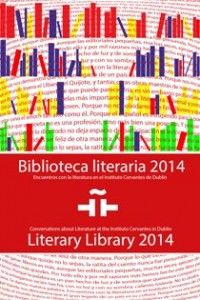 Porque Irlanda nos demuestra que el gran legado de un país es su cultura. Porque nos encantaría que todo el mundo leyera el Ulises y el Quijote, y tantas otras obras maestras de nuestras literaturas. Porque Borges, bajo una superficie que puede parecer fría, es sin embargo profundamente humano. Porque Drácula es una de las diez novelas más importantes de la literatura universal y porque su autor, Bram Stoker, está cada día más joven, hoy os presentamos Biblioteca literaria 2014: Encuentros con la literatura en el Instituto Cervantes de Dublín.
Porque Irlanda nos demuestra que el gran legado de un país es su cultura. Porque nos encantaría que todo el mundo leyera el Ulises y el Quijote, y tantas otras obras maestras de nuestras literaturas. Porque Borges, bajo una superficie que puede parecer fría, es sin embargo profundamente humano. Porque Drácula es una de las diez novelas más importantes de la literatura universal y porque su autor, Bram Stoker, está cada día más joven, hoy os presentamos Biblioteca literaria 2014: Encuentros con la literatura en el Instituto Cervantes de Dublín.
Porque el español es estupendo para la poesía, y porque hay quien dice que ser poeta no es una profesión, sino más bien una posesión. Porque hay que escribir si sientes que no podrás ser feliz de otra manera. Porque lo que busca un escritor es contar conflictos y porque, aunque quizás no lo sepas, la ratita del cuento nunca fue presumida. Por todo ello y por mil razones más hemos hecho este libro para ti, querido lector. Porque la palabra es un pan hecho de luz y de sombra que queremos compartir contigo. Aquí te la entregamos recién hecha, con su luz y con su sombra, caliente todavía. No lo dudes, merece la pena. Te damos nuestra palabra.
Biblioteca Literaria 2014 contiene catorce entrevistas con escritores y editores, en versión bilingüe español–inglés. En ellas se tratan temas tan diversos como la literatura fantástica, el cine, la creación poética, o la obra de autores como Federico García Lorca, Jorge Luis Borges, James Joyce o Bram Stoker. El libro ofrece también acceso a las versiones en video de estas entrevistas. A partir de hoy, está a tu disposición en nuestra biblioteca electrónica con tu número de carné de biblioteca y tu contraseña. Si no lo tienes todavía, puedes descargar el libro en formato PDF desde este mismo enlace.
Because Ireland has proven that the great legacy of a country is its culture. Because we would love everybody to read Ulysses and Don Quixote, and many other literary masterpieces. Because Borges is profoundly human, behind a surface that seems cold. Because Dracula is one of the ten most important novels of world literature and because its author, Bram Stoker, is getting younger everyday, today we present to you our Literary Library 2014: Conversations About Literature at the Instituto Cervantes in Dublin.
Because Spanish is great for poetry and some say that being a poet is not a profession but rather a possession. Because you have to write if you think you’ll be unhappy otherwise. Because a writer seeks ways to address conflicts and because, though you may not know it, the little rat of the tale was never vain. These are some of the thousands of reasons we made this book for you, dear reader. A word is a loaf of bread, made of light and shadow that we would like to share with you. Here we give it to you freshly made, with its light and its shadow, still warm. Don’t hesitate, it’s worth it. We give you our word.
Literary Library 2014 is a bilingual Spanish-English e-book containing fourteen interviews with writers and publishersthat took place at the Damaso Alonso Library during 2012.Literary Library 2014 contains interviews with Miguel Aguilar, Luis Alegre, Malcolm Otero Barral, Luis Alberto de Cuenca, Ángel Guinda, Ana Cristina Herreros, Alicia Mariño, Ignacio Martínez de Pisón, Judith Mok, Antonio Praena, Bill Richardson, Manuel Rivas, Ada Salas, David Trueba and Juan Gabriel Vásquez.
In these conversations we cover topics as diverse as Fantastic literature, cinema, poetic creation, or the work of authors such as Jorge Luis Borges, Federico García Lorca, James Joyce or Bram Stoker. You can download it right now from our e-library with your membership number and your password. If you don’t still have a library card, you can download this bilingual e-book in PDF format following this link.
The book also offers access to the videos of these interviews and other recommended links.
10 escritores para invitar a casa durante el fin de semana / 10 writers to invite home for the weekend
¿Qué os parece si este fin de semana nos repatingamos en el sillón e invitamos alguno de estos diez autores para que nos visiten con sus historias en el salón de nuestra casa? Son diez autores de éxito, traducidos y premiados, reconocidos internacionalmente, cuyas novelas podéis descargar cómodamente desde vuestra casa a través de nuestra biblioteca electrónica. A ver qué os parece la selección (por orden alfabético, para que nadie se moleste):
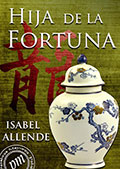 Isabel Allende ¿Quién no ha leído al menos un libro de Isabel Allende, quién no la conoce? Podéis elegir entre La hija de la fortuna (en la imagen) y otros 15 títulos de su extensa bibliografía: El bosque de los pigmeos, La casa de los espíritus, La ciudad de las bestias, Cuentos de Eva Luna, De amor y de sombra, Eva Luna, Inés del alma mía, La isla bajo el mar, Mi país inventado, Paula, El plan infinito, El reino del dragón rojo, Retrato en sepia, La suma de los días, o El zorro.
Isabel Allende ¿Quién no ha leído al menos un libro de Isabel Allende, quién no la conoce? Podéis elegir entre La hija de la fortuna (en la imagen) y otros 15 títulos de su extensa bibliografía: El bosque de los pigmeos, La casa de los espíritus, La ciudad de las bestias, Cuentos de Eva Luna, De amor y de sombra, Eva Luna, Inés del alma mía, La isla bajo el mar, Mi país inventado, Paula, El plan infinito, El reino del dragón rojo, Retrato en sepia, La suma de los días, o El zorro.
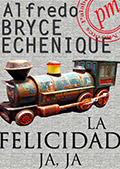 Alfredo Bryce Echenique ¿Habéis leído ya La felicidad, ja ja? ¿Y su obra maestra, Un mundo para Julius? Entonces podéis continuar con A vuelo de buen cubero, Huerto cerrado, o con Tantas veces Pedro.
Alfredo Bryce Echenique ¿Habéis leído ya La felicidad, ja ja? ¿Y su obra maestra, Un mundo para Julius? Entonces podéis continuar con A vuelo de buen cubero, Huerto cerrado, o con Tantas veces Pedro.
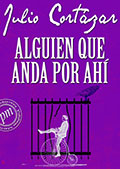 Julio Cortázar Del gran escritor argentino os ofrecemos todo. No creo que se nos escape ningún título. Vamos a ver: Alguien que anda por ahí, Las armas secretas, Bestiario, De pameos y meopas, Deshoras, Diario de Andrés Fava, Divertimento, El examen, Final del juego, Los relatos, Los reyes, Salvo el crepúsculo, Un tal Lucas, Todos los fuegos el fuego, Viaje alrededor de una mesa, La vuelta al día en ochenta mundos, 62. Modelo para armar, Historias de cronopios y de famas, Libro de Manuel, Octaedro, La otra orilla, Papeles inesperados, El perseguidor y otros cuentos de cine, Los premios, Presencia, Queremos tanto a Glenda, y cómo no, Rayuela.
Julio Cortázar Del gran escritor argentino os ofrecemos todo. No creo que se nos escape ningún título. Vamos a ver: Alguien que anda por ahí, Las armas secretas, Bestiario, De pameos y meopas, Deshoras, Diario de Andrés Fava, Divertimento, El examen, Final del juego, Los relatos, Los reyes, Salvo el crepúsculo, Un tal Lucas, Todos los fuegos el fuego, Viaje alrededor de una mesa, La vuelta al día en ochenta mundos, 62. Modelo para armar, Historias de cronopios y de famas, Libro de Manuel, Octaedro, La otra orilla, Papeles inesperados, El perseguidor y otros cuentos de cine, Los premios, Presencia, Queremos tanto a Glenda, y cómo no, Rayuela.
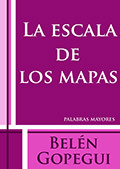 Belén Gopegui es una de nuestras autoras preferidas. ¿Cuántas veces la hemos recomendado ya? Pues nunca nos cansamos. Tenéis a vuestra disposición Lo real y La escala de los mapas.
Belén Gopegui es una de nuestras autoras preferidas. ¿Cuántas veces la hemos recomendado ya? Pues nunca nos cansamos. Tenéis a vuestra disposición Lo real y La escala de los mapas.
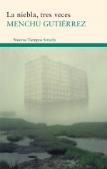 Menchu Gutiérrez Dos títulos también de esta autora: La niebla, tres veces y El faro por dentro.
Menchu Gutiérrez Dos títulos también de esta autora: La niebla, tres veces y El faro por dentro.
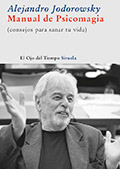 Alejandro Jodorowsky Uno de esos autores que no deja indiferente a nadie. ¿Conocéis ya el Manual de psicomagia: consejos para sanar tu vida? También podéis descargar El maestro y las magas, Evangelios para sanar, La danza de la realidad, Ojo de Oro: (Metaforismos, Psicoproverbios y Poesofía) y Psicomagia :Esbozos de una terapia pánica.
Alejandro Jodorowsky Uno de esos autores que no deja indiferente a nadie. ¿Conocéis ya el Manual de psicomagia: consejos para sanar tu vida? También podéis descargar El maestro y las magas, Evangelios para sanar, La danza de la realidad, Ojo de Oro: (Metaforismos, Psicoproverbios y Poesofía) y Psicomagia :Esbozos de una terapia pánica.
 Rosa Montero es una de las autoras con mayor éxito de ventas a lo largo de su ya extensa carrera literaria. Podéis elegir entre Amado amo, Crónica de desamor, La función Delta, Temblor y Te trataré como a una reina.
Rosa Montero es una de las autoras con mayor éxito de ventas a lo largo de su ya extensa carrera literaria. Podéis elegir entre Amado amo, Crónica de desamor, La función Delta, Temblor y Te trataré como a una reina.
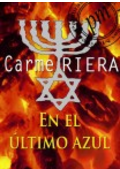 Carme Riera es la miembro más reciente de la Real Academia Española, desde noviembre 2013. En nuestra biblioteca electrónica contamos con los títulos Contra el amor en compañía y otros relatos, Cuestión de amor propio, En el último azul, Tiempo de espera y Una primavera para Doménico Guarini.
Carme Riera es la miembro más reciente de la Real Academia Española, desde noviembre 2013. En nuestra biblioteca electrónica contamos con los títulos Contra el amor en compañía y otros relatos, Cuestión de amor propio, En el último azul, Tiempo de espera y Una primavera para Doménico Guarini.
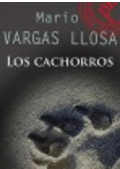 Mario Vargas Llosa debería estar sin duda mejor representado, pero aún así podemos disfrutar de dos de sus títulos más emblemáticos: Los jefes y Los cachorros.
Mario Vargas Llosa debería estar sin duda mejor representado, pero aún así podemos disfrutar de dos de sus títulos más emblemáticos: Los jefes y Los cachorros.
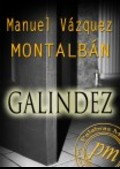 Y para terminar, siempre merece la pena recordar al añorado Manuel Vázquez Montalbán con títulos como Autobiografía del general Franco, Crónica sentimental de España, El estrangulador, Galíndez, Informe sobre la información, El manifiesto subnormal y El pianista.
Y para terminar, siempre merece la pena recordar al añorado Manuel Vázquez Montalbán con títulos como Autobiografía del general Franco, Crónica sentimental de España, El estrangulador, Galíndez, Informe sobre la información, El manifiesto subnormal y El pianista.
Lo mejor de todo es que si preferís otro tipo de literatura, otros autores, solo tenéis que teclear su nombre en la caja de búsqueda. Tenéis más de 2650 títulos a vuestra disposición. Está clarísimo: con nuestra biblioteca electrónica, el que no lee buenos libros en español es porque no quiere.
What do you think if this weekend we sat back in our favorite chair and invite any of these ten authors to visit us with their stories? They are ten successful authors, whose novels can be downloaded easily from our electronic library. See what you think of the selection (please find the list above).
Best of all, if you prefer another type of literature or other authors, you can just type their name in the search box. You have about 2650 titles available on our e-book platform. Let’s make it clear: with our electronic library, if you don’t read good books in Spanish it’s simply because you don’t want to.
Octavio Paz en su centenario / Celebrating 100th anniversary of the birth of Octavio Paz
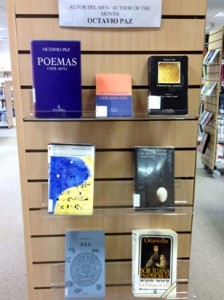 En 2014 se cumplen cien años del nacimiento de gigantes de la literatura hispánica como Bioy Casares (Argentina), Nicanor Parra (Chile), Julio Cortázar (Argentina) y Octavio Paz (México).
En 2014 se cumplen cien años del nacimiento de gigantes de la literatura hispánica como Bioy Casares (Argentina), Nicanor Parra (Chile), Julio Cortázar (Argentina) y Octavio Paz (México).
Tendremos tiempo de hablar de todos ellos a lo largo del año. Hoy nos centraremos en la figura de Octavio Paz, Premio Nobel de Literatura en 1990, que habría cumplido 100 años el próximo 31 de marzo, porque el pasado 26 de febrero la Embajada de México en Madrid presentó el programa de actos que celebrarán el nacimiento del poeta en España.
El Instituto Cervantes en Madrid comenzó las celebraciones del centenario con un Homenaje a Octavio Paz el pasado 30 de enero, con una charla del también escritor mexicano Juan Villoro que fue presentada por el director del Instituto Cervantes, Víctor García de la Concha y por Alicia Mayer, directora del Centro de Estudios Mexicanos de la UNAM (Universidad Nacional Autónoma de México), que tiene su sede en el Instituto Cervantes. Aquí tenéis el video completo de esa charla.
En Dublín, la Embajada de México en Irlanda y el Instituto Cervantes también tienen previsto homenajear a Octavio Paz con diferentes actividades. De hecho, la celebración de la tercera edición del Festival Isla de Literatura en 2014 estará dedicada a él y a Julio Cortázar, con la colaboración, igualmente, de la Embajada Argentina en Irlanda.
La biblioteca del Instituto Cervantes de Dublín ha querido sumarse a estos homenajes haciendo de Paz su autor del mes de marzo y abril. Felicidades Octavio y felicidades a todos los lectores que leen en español.
2014 marks the centenary of the birth of giants of Hispanic literature as Bioy Casares (Argentina), Nicanor Parra (Chile), Julio Cortázar (Argentina) and Octavio Paz (Mexico) .
We will talk about all of them throughout the year. But today we want to focus on the figure of Octavio Paz, Nobel Prize for Literature in 1990, born the 31st of March 1914, because on 26th February, the Embassy of Mexico in Madrid presented the program of events that will be held in Spain to celebrate the birth of the poet.
Instituto Cervantes in Madrid launched the centenary celebrations with a Tribute to Octavio Paz on 30th January with a talk by the Mexican writer Juan Villoro, presented by the director of the Instituto Cervantes, Victor Garcia de la Concha and Alicia Mayer, director of the Center for Mexican Studies at UNAM, which is based in Madrid, at the Instituto Cervantes. Above is the link for the full video of that talk.
In Dublin , the Embassy of Mexico in Ireland and the Instituto Cervantes also plan to honor Octavio Paz with different activities. In fact, the celebration of the third edition of the Isla Festival of Literature will be dedicated to him and Julio Cortázar.
In our library, he is our author of the month during March and April. Happy birthday Octavio! Congratulations to all the readers that had the opportunity to read his books.
Audiolibro de la semana / Audiobook of the week: Vivir del viento
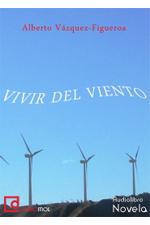 Tras Tuareg y Los ojos del tuareg, vuelve Alberto Vázquez -Figueroa, uno de los autores españoles más leídos en España y en el mundo, a nuestra lista de audiolibros de la semana.
Tras Tuareg y Los ojos del tuareg, vuelve Alberto Vázquez -Figueroa, uno de los autores españoles más leídos en España y en el mundo, a nuestra lista de audiolibros de la semana.
Vivir del viento es una novela de intriga en la que se destapan los sucios negocios que se esconden detrás de la energía limpia del viento. Poderosos grupos empresariales aprovechan los inmensos parques eólicos que pueblan las llanuras de Estados Unidos para facturar grandes sumas por la producción de una electricidad que en realidad no llega a aprovecharse. Es por eso por lo que un grupo de personajes vinculados al mundo del cine deciden realizar una película de denuncia sobre el tema.
Seguro que te va a gustar. Para descargarla, solo necesitas tener a mano tu número de usuario y tu contraseña.
After Tuareg and Los ojos del Tuareg, Alberto Vázquez-Figueroa, one of the most widely read Spanish authors in Spain and worldwide, comes back to our audiobooks of the week list.
Vivir del viento is a thriller in which the dirty business hidden behind the clean energy of the wind are uncovered.
Powerful business groups use the huge wind farms that cover the plains of the United States to bill for producing large amounts of electricity that does not really get used. That’s why a group of people linked to the film industry decide to make a film on this subject.
We are sure you will enjoy this audiobook. You just need your library card with your username and your password.
Pudor, de Santiago Roncagliolo, nuestro audiolibro de la semana / Audiobook of the week
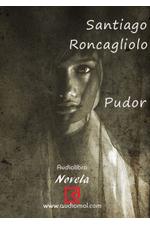 De Santiago Roncagliolo ofrecimos anteriormente su libro Matías y los imposibles, especialmente interesante para los más pequeños de la casa. Hoy os sugerimos, como audiolibro de la semana, la obra que lo convirtió en uno de los escritores jóvenes con más proyección en España y en América Latina.
De Santiago Roncagliolo ofrecimos anteriormente su libro Matías y los imposibles, especialmente interesante para los más pequeños de la casa. Hoy os sugerimos, como audiolibro de la semana, la obra que lo convirtió en uno de los escritores jóvenes con más proyección en España y en América Latina.
Pudor es un libro sobre la intimidad, sobre los deseos y los miedos que no nos atrevemos a contar a nadie, ni siquiera a las personas que más queremos. Pudor es una novela sobre los secretos con que nos protegemos para que los demás no nos hagan daño. Sus personajes son un hombre que va a morir, una mujer que recibe anónimos pornográficos, un niño que ve cadáveres, un gato que quiere sexo… Como muchas familias, todos esos personajes viven juntos y todos están solos.
Para escuchar este audiolibro, solo necesitas tu carné de biblioteca y tu contraseña. Si no lo tienes todavía, ¿a qué esperas para hacerte socio?
One year ago, we talked in our blog about other audiobook by Santiago Roncagliolo, Matías y los imposibles, especially interesting for the youngest readers and listeners. Today, we bring you the novel that made Santiago Roncagliolo one of the most promising young writers in Spain and Latin America.
Pudor is a book about intimacy, about the desires and fears that we dare not tell anyone. Pudor is a novel about the secrets that protect us. It’s characters are a man who is going to die, a woman who receives pornographic messages, a child who sees dead bodies, a cat looking for sex … Like many families, all these characters are living together and they are all alone.
To listen to this audiobook, you just need your library card and your password. If you didn’t get it, what are you waiting for? Become a member today!
Nunca es tarde para el amor / It’s never too late for love
Porque nunca es tarde para el amor, porque hoy hace un precioso día de primavera y porque cualquier momento es bueno para leer buena literatura, hoy te proponemos 10 libros cuyas historias giran en torno al amor y que puedes descargarte en tu dispositivo móvil sin salir de casa, siempre y cuando tengas a mano el carné de biblioteca y tu contraseña. ¿Que no la recuerdas? Pues escríbenos un mensaje a bibdub@cervantes.es
No son, necesariamente, 10 historias románticas, porque a Cupido le gusta disfrazarse. Son, sobre todo, diez buenas historias firmadas por diez grandes escritores españoles.
Puedes descargar los libros cuando quieras, pero no los 10 a la vez. Recuerda que son libros electrónicos en préstamo. Una vez descargado el título en tu lector, dispones de 15 días para leerlo. Así que date prisa si te interesa alguno en especial. Descárgalo rápido, porque en nuestra biblioteca solo tenemos cinco «copias» (licencias) de cada uno de ellos (solo 5 personas lo pueden descargar al mismo tiempo). ¿Tienes dudas? ¡Escríbenos!
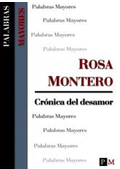 1. Crónica del desamor, de Rosa Montero.
1. Crónica del desamor, de Rosa Montero.
Ana ha convivido tres años con Juan, un escritor, y tras la ruptura intenta poner orden en su vida, criando a un hijo y respondiendo a las expectativas profesionales de sus superiores en una época convulsiva dentro de la historia española reciente.
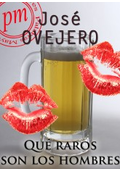 2. Qué raros son los hombres, de José Ovejero.
2. Qué raros son los hombres, de José Ovejero.
Un hombre que trata de no prestar atención a las mulatas que se le ofrecen en Cuba; una mujer que recibe cada día la llamada obscena de un maníaco; un joven que observa con curiosidad a los dos homosexuales con los que comparte piso; y un hombre que no puede dejar de contemplar, por más que lo intente, a la mujer deseable en que se ha convertido su hija… ¿Tan raros son los hombres?
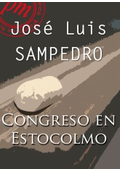 3. Congreso en Estocolmo, de José Luis Sampedro.
3. Congreso en Estocolmo, de José Luis Sampedro.
Un catedrático de matemáticas de un instituto soriano es invitado a un congreso en Estocolmo. Allí conocerá a unos personajes y una forma de vivir nuevos para él. El encuentro con una joven sueca le hará redescubrir el amor y replantearse su forma de vida.
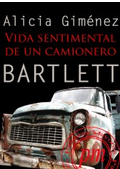 4. Vida sentimental de un camionero, de Alicia Gimenez Bartlett.
4. Vida sentimental de un camionero, de Alicia Gimenez Bartlett.
Rafael es un joven camionero que lucha por mantener el equilibrio en su complicado mundo sentimental. A lo largo de la novela, buscará reafirmar su masculinidad manteniendo una actitud de dominio sin cuartel sobre las mujeres, sin darse cuenta de que en el ámbito femenino que le rodea las cosas están cambiando. Vida sentimental de un camionero se desarrolla en un mundo masculino, poblado por chicas de alterne y hombres curtidos en mil batallas cotidianas. En este ambiente sórdido se forja un entramado de historias de amor y de pasiones en las que el sexo no es más que un modo de evadirse de la soledad.
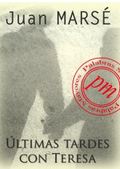 5. Últimas tardes con Teresa, de Juan Marsé
5. Últimas tardes con Teresa, de Juan Marsé
Últimas tardes con Teresa marca el nacimiento del Pijoaparte, uno de los personajes más fuertes, originales y sugestivos de toda la literatura de esa época, y que parece el doble canalla del propio Marsé. La identificación autor/personaje funciona con una precisión y eficacia demoledoras, y lo que empieza siendo la historia amorosa de una niña bien, rebelde e ingenua (Teresa) y un charnego barriobajero, desarraigado y ladrón de motos (el Pijoaparte), termina como una formidable sátira y encarnación del tiempo en que transcurre esa breve e intensa relación pasional.
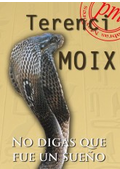 6. No digas que fue un sueño, de Terenci Moix
6. No digas que fue un sueño, de Terenci Moix
Una novela sobre las fases del amor, enmarcada en un período histórico apasionante, los estertores del Egipto amenazado por el imperialismo de la todopoderosa Roma. Pero es, sobre todo, un intento de reivindicar la figura de una de las mujeres más fascinantes de la historia, Cleopatra Séptima. Desfigurada a menudo por el cine, Cleopatra se erige en esta novela como un personaje original y contradictorio. Ya no es la típica devoradora de hombres, sino una mujer cultivada, maternal, enamorada y, sobre todo, entregada por completo a la política. A su alrededor, los avatares de una ciudad mítica: Alejandría.
7. Mi querido Sebastián, de Olga Guirao
Guillermo India, que tiene veinticinco años en la oscura década de los cincuenta, está enamorado de su amigo Sebastián, e intenta eludir la cerrazón de su clase social y de aquella España dedicándose a la música. Podría llegar a ser un buen concertista de violín si lograra vencer una cierta desgana que le domina, y tal vez conocer la verdad de su fascinación por Sebastián. Cuando Guillermo cumple los veintiséis años, la presión familiar y el aburrimiento le conducen al matrimonio.
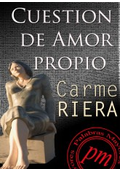 8. Cuestión de amor propio, de Carme Riera
8. Cuestión de amor propio, de Carme Riera
Tras un largo año de silencio, Angela, una novelista entrada en años, escribe a su amiga Ingrid para darle razón de lo ocurrido. Se trata, sencillamente, de una historia de amor, una triste aventura en la que Ángela lo ha apostado todo por un hombre cuya máscara confundió con un favorecedor espejo de sí misma. En un discurso vehemente y contradictorio, en el que inútilmente se intenta atrapar el complejo nudo de los elementos en juego, Ángela, con una melancólica resignada y amarga, descorre el telón de su amor por Miguel, amor que, quizá como todos, se resuelve, descarnadamente, en una cuestión de amor propio.
 9. La escala de los mapas, de Belén Gopegui
9. La escala de los mapas, de Belén Gopegui
Si el amor platónico dice si…, si un día, en una parada de autobús, un hombre que fantasea con encontrarse a la mujer de quien estuvo enamorado sin ser correspondido se la encuentra, si ella le toma del brazo, se muestra ilusionada, ríe: ¿entonces qué hacer con la realidad?. Sergio Prim, geógrafo de profesión, ha visto cómo su sueño de amor por Brezo Varela se cumplía y ha sentido pánico. A lo largo de la novela buscará un hueco, un punto de quietud, una zona exenta de preocupaciones. Tal vez pueda vencer allí su dificultad para entender la escala de los otros -esto es, el modo según el cual los otros establecen relaciones de semejanza, distancia o proximidad-, acaso logre entonces poner a salvo su relación con Brezo.
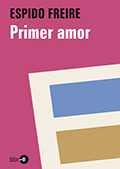 10. Primer amor, de Espido Freire
10. Primer amor, de Espido Freire
No se vive más amor que el primero, a partir de ahí, comienzan a amontonarse. De hecho, no se siente más amor que el primero, rememorado una y otra vez”. Apoyándose en cuentos tradicionales y grandes pasajes románticos de la literatura universal, Freire consagra este su primer ensayo al primer amor y a su validez eterna.
There is a beautiful sunny day out there, a perfect time for reading good literature. In our library, we are still remembering Saint Valentine, as it’s never too late for love, so we suggest today 10 books about love. 10 titles you can download to your mobile device while sitting comfortably at home. For downloading these e-books, you just need your library card and your password. If you don’t remember it, please send us a message to bibdub@cervantes.es
You can download these e-books at anytime, but not all of them at once. Remember that the downloaded e-books are “on loan”. Once you download the title to your reader, you have 15 days to read it. So if you are specially interested in one of them, download it as quick as possible, because in our library we have just five “copies” (licenses) for each title (wich means that only 5 people can download that specific e-book at the same time ) . Any doubts? contact us!
Fragmentos de interior. Audiolibro de la semana / Audiobook of the week
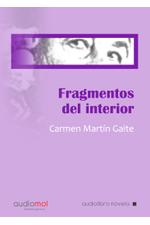 ¿Está la mujer en crisis?, ¿qué les pasa a las mujeres? Desde la trilogía Millenium de Stieg Larsson hasta las 50 sombras de Grey de E. L. James, pasando por El tiempo entre costuras de María Dueñas, son personajes femeninos los que protagonizan una y otra vez las novelas que se han convertido en mayor éxito de ventas a nivel internacional en los últimos años. Títulos que, como el de María Dueñas, cuentan historias de superación, de valor frente a la adversidad, de recuperación tras una grave crisis.
¿Está la mujer en crisis?, ¿qué les pasa a las mujeres? Desde la trilogía Millenium de Stieg Larsson hasta las 50 sombras de Grey de E. L. James, pasando por El tiempo entre costuras de María Dueñas, son personajes femeninos los que protagonizan una y otra vez las novelas que se han convertido en mayor éxito de ventas a nivel internacional en los últimos años. Títulos que, como el de María Dueñas, cuentan historias de superación, de valor frente a la adversidad, de recuperación tras una grave crisis.
Quizás sea simplemente que los editores se han dado cuenta finalmente de que las que leen de verdad, las que siguen comprando libros a pesar de todo, son las mujeres. Y quizás sea eso lo que les hace apostar una y otra vez por autoras como Carmen Amoraga, Clara Sánchez o Mara Torres.
Pero el éxito de la mujer como personaje literario no viene de ahora. Antes de Carmen Amoraga y Clara Sánchez disfrutamos de los personajes de Elvira Lindo, Belén Gopegui, Laura Freixas o Almudena Grandes (puestos a hablar de sexo, Las edades de Lulú mucho mejor que 50 sombras de Grey, por cierto). Y antes que ellas hubo escritoras ya clásicas que hicieron visible en un texto al ama de casa, la relación madre-hija, la introspección femenina, o nos hicieron plantearnos los distintos modelos de mujer (la contraposición entre la que trabaja fuera de casa y la que no, por ejemplo).
Son palabras de Laura Freixas a propósito de Carmen Martín Gaite, una de estas maestras de la literatura en español que hoy firma nuestro audiolibro de la semana. De esta autora ofrecimos anteriormente los audiolibros Caperucita en Manhattan y El balneario. Hoy, el título elegido es Fragmentos de interior, una novela que cuenta la historia de Luisa, una joven de 20 años que deja atrás su pueblo para comenzar una nueva vida en Madrid.
Como diría Laura Freixas, aún hoy hay temas escandalosamente ausentes de la literatura y que son difíciles de tratar porque provocan mucho rechazo o porque se asocian a la subcultura (son temas “de revista femenina”, no se consideran “serios”)… Pero gracias a estas autoras, a las de antes y a las de ahora, ya van quedando menos.
What happens to women? From Stieg Larsson’s Millenium trilogy up to 50 shades of Grey E. L. James , including El tiempo entre costuras by María Dueñas, female characters star again and again the most successful international bestsellers in recent years. Stories of coping, courage and recovery after a serious crisis.
Maybe it’s just that publishers have finally realized that the ones actually read , the ones still buy books, are women. And perhaps that’s what makes them rely on authors such as Carmen Amoraga, Clara Sánchez or Mara Torres.
But the success of women as a literary character is nothing new. Before Carmen Amoraga and Clara Sánchez we enjoyed the characters written by Elvira Lindo, Belen Gopegui, Laura Freixas or Almudena Grandes (by the way, talking about sex, Las edades de Lulú is much better than 50 Shades of Grey). And before them, there were already classic writers that made visible in a novel the role of a housewife , the mother-daughter relationship or female introspection.
These are Laura Freixas’ words about Carmen Martín Gaite, one of these masters of literature in Spanish, the author of our audiobook of the week. We previously suggested Caperucita in Manhattan and El Balneario, also by Carmen Martín Gaite. Today, we have chosen Fragmentos de interior, a novel that tells the story of Louise, a 20 -year-old who leaves behind his village to start a new life in Madrid. Enjoy!
Rafael Chirbes y el audiolibro de la semana / Audiobook of the week
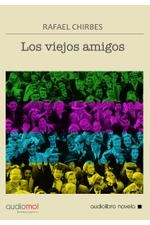 En dos ocasiones anteriores hemos hablado en nuestro blog de Rafael Chirbes, a propósito de títulos como Los disparos del cazador o La buena letra, disponibles a través de nuestra plataforma de descarga de audiolibros. Ahora volvemos de nuevo a él porque probablemente sea este escritor valenciano el autor de mayor prestigio en España en estos momentos.
En dos ocasiones anteriores hemos hablado en nuestro blog de Rafael Chirbes, a propósito de títulos como Los disparos del cazador o La buena letra, disponibles a través de nuestra plataforma de descarga de audiolibros. Ahora volvemos de nuevo a él porque probablemente sea este escritor valenciano el autor de mayor prestigio en España en estos momentos.
Rafael Chirbes recibió el día 22 de enero el Premio Francisco Umbral al mejor libro del año por En la orilla, editado por Anagrama. Este premio se suma además a los elogios de la crítica en diferentes medios. Así por ejemplo, el suplemento cultural Babelia, del diario El País, a través de 56 críticos y periodistas, también concedía a este título el honor de ser la “novela del año”.
Si bien es cierto que hay críticos que aborrecen este tipo de listas y de selecciones del año, nadie discute la calidad de este autor que ya quedó patente con Crematorio (2007), aquel potente retrato de la España de la especulación inmobiliaria y la corrupción asociada a ella.
Nuestro audiolibro de la semana viene firmado por él. Se titula Los viejos amigos y es su séptima novela, anterior justamente a Crematorio. Fue publicada por primera vez en 2003 y cuenta la historia de un grupo de viejos camaradas que estuvieron unidos en el pasado por un proyecto común, aunque poco concreto: la revolución.
¿Sabes cómo descargar este audiolibro? Solo necesitas tu carné de usuario y tu contraseña.
On two previous occasions, we have spoken on our blog about Rafael Chirbes and novels like Los disparos del cazador or La buena letra, both available through our downloading platform for audiobooks and electronic books. Now, we return to the Valencian writer as he is probably the most prestigious author in Spain at the moment.
Rafael Chirbes received on 22nd Jan. the Francisco Umbral Award for best book of the year by En la orilla, published by Anagrama. Before that, 56 critics and journalists from El País and its cultural suplement, Babelia, also gave this title the honor of being the “novel of the year.”
There are critics who abhor such lists of “books of the year”, but no one disputes the quality of Rafael Chirbes, a quality that was made already evident with Crematorio (2007), a powerful portrait of Spain during the years of property speculation and corruption associated to it.
Our audiobook of the week is his seventh novel, Los viejos amigos, written just before Crematorio and published in 2003. Los viejos amigos tells the story of a group of old comrades who were united by a past in common, a joint project: the revolution.
Do you know how to download this audiobook? You just need your library card and your password.
Audiolibro de la semana / Audiobook of the week: La modelo descalza
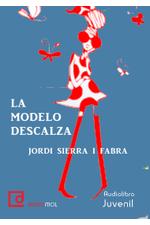 Jordi Sierra i Fabra es un autor bien conocido por todos los lectores de este blog. Sin duda, uno de nuestros favoritos. Anteriormente, hemos ofrecido a través de nuestra biblioteca electrónica otros de sus títulos como El asesinato de Johan Sebastian Bach o Kafka y la muñeca viajera, ambos muy bien valorados por nuestros lectores.
Jordi Sierra i Fabra es un autor bien conocido por todos los lectores de este blog. Sin duda, uno de nuestros favoritos. Anteriormente, hemos ofrecido a través de nuestra biblioteca electrónica otros de sus títulos como El asesinato de Johan Sebastian Bach o Kafka y la muñeca viajera, ambos muy bien valorados por nuestros lectores.
Hoy os proponemos, como audiolibro de la semana, La modelo descalza, otra de sus novelas de misterio, protagonizada en esta ocasión por el periodista Jon Boix quien, a su regreso de un viaje por África, se ve abocado a investigar un asesinato del que es acusada su novia de hace tres años.
Alejandra, la acusada, es una famosa modelo española, habitual de las portadas de las revistas y de los programas del corazón. Pero sobre todo, para Jon, Alejandra es un ser humano que tiene derecho a defender su inocencia.
Esperamos que te guste y, ya sabes, si tienes algún problema para acceder a tu biblioteca electrónica, estamos a tu disposición.
Jordi Sierra i Fabra is well known to all readers of this blog. Definitely one of our favorites writers. Previously, we offered through our online library two of his titles: The Murder of Johan Sebastian Bach and Kafka y la muñeca viajera, both very highly rated by our patrons.
Today we propose, as audiobook of the week, La modelo descalza, another of his detective novels, starred this time Jon Boix, a journalist who is led to investigate a murder, on his return from a trip to Africa.
Alejandra, his ex girlfriend, is accused of murdering her companion in a hotel, after a night of alcohol and drugs. She is a famous Spanish top model, always present in magazine covers and gossip TV programs. But above all, for Jon, Alejandra is a human being who has the right to defend her innocence.
We hope you enjoy the audiobook and, if you have any problems in accessing our digital library, please remember we are always happy to help!
Premios nacionales versus premios comerciales / National Awards vs Launching Pad Awards
 Si la semana pasada hablábamos de los Premios Goya, hoy lo hacemos sobre otro tipo de premios. Premios principalmente literarios, porque la potente industria editorial española, ya a comienzos de enero, pone en marcha toda su maquinaria y comienza a ofrecer titulares de prensa a los lectores ávidos de novedades. Así, el 6 de enero se concede el Premio Nadal, el más antiguo de España con 70 años de historia.
Si la semana pasada hablábamos de los Premios Goya, hoy lo hacemos sobre otro tipo de premios. Premios principalmente literarios, porque la potente industria editorial española, ya a comienzos de enero, pone en marcha toda su maquinaria y comienza a ofrecer titulares de prensa a los lectores ávidos de novedades. Así, el 6 de enero se concede el Premio Nadal, el más antiguo de España con 70 años de historia.
El Premio Nadal, otorgado este año a la escritora española Carmen Amoraga con la novela La vida era eso, presume además de haber marcado con sus títulos buena parte de la literatura española del siglo XX. Entre sus obras ganadoras figuran títulos como Nada, de Carmen Laforet, primera ganadora del premio en 1944, que supuso un revulsivo en la literatura española de posguerra, La sombra del ciprés es alargada de Miguel Delibes en 1947, El Jarama (1955), título después repudiado por su autor, Rafael Sánchez Ferlosio, Entre visillos (1957) de Carmen Martín Gaite, Primera memoria (1959) de Ana María Matute o Un hombre que se parecía a Orestes (1968) de Álvaro Cunqueiro.
Sin embargo, como decía Miguel Aguilar durante la conversación que mantuvimos con él hace unos meses, estos premios comerciales a obra inédita son una peculiaridad de España:
«Creo que hay que distinguir entre los premios que son a obra publicada: el Premio Nacional de Ensayo, Premio Nacional de Literatura, el Premio Salambó, por ejemplo, que se concede en Barcelona… y los premios a obra sin publicar (…). Los premios que se dan a obras sin publicar, hay que considerarlos más bien como una plataforma de lanzamiento, más que como un reconocimiento de una calidad intrínseca. Y como tal, yo creo que sirven para llamar la atención de los lectores sobre una obra determinada».
¿Qué hay entonces de esos «premios nacionales» que menciona Miguel Aguilar?
Estos premios son concedidos cada año por el Ministerio de Educación Cultura y Deporte de España a través de la Subdirección General de Promoción del Libro, la Lectura y las Letras Españolas (SGPLLL), unos premios que «tienen como objetivo estimular la creación literaria» así como reconocer «la labor en pro de la difusión de la cultura de determinadas entidades y profesionales.» Los galardonados en 2013 fueron:
- Premio Nacional de Poesía: Manuel Álvarez Torneiro por Os ángulos da brasa.
- Premio Nacional de Narrativa: José María Merino por El río del Edén.
- Premio Nacional de Ensayo: Santiago Muñoz Machado por Informe sobre España. Repensar el estado o destruirlo.
- Premio Nacional de las letras Españolas: Luis Goytisolo.
- Premio nacional del Comic: Miguelanxo Prado por Ardalén.
- Premio Nacional de Literatura Dramática: Juan Mayorga por La lengua en pedazos.
- Premio Nacional de Literatura Infantil y juvenil: César Mallorquí por La isla de Bowen.
- Premio Nacional de Poesía Joven Miguel Hernández: Unai Velasco por En este lugar.
- Premio Nacional Historia de España: José Ángel Sánchez Asiaín por La financiación de la Guerra Civil española.
- Premio Nacional a la Mejor Traducción: Carmen Montes Cano por Kallocaína.
- Premio Nacional a la Obra de un Traductor: Josu Zabaleta.
- Premio Nacional de Ilustración: Carme Solá.
- Premio Nacional de Periodismo Cultural: Antón Castro.
- Premio Nacional a la Mejor Labor Editorial Cultural: Editorial Turner.
- Premio Nacional de Fomento de la Lectura: Suplemento Cultura/s de La Vanguardia y Asociación de Profesionales de Bibliotecas Móviles (ACLEBIM).
Estos premios son solo una parte de los Premios Nacionales de Cultura, que incluyen también otras áreas como Promoción del Arte, Artes Escénicas y Música, Patrimonio Histórico, Industrias Culturales y Tauromaquia.
En nuestra biblioteca, durante los meses de enero y febrero, te proponemos precisamente una selección de títulos que han sido galardonados, a lo largo de estos últimos años, con premios nacionales o con premios comerciales. Así tú decides cuál es el que te parece mejor.
If last week we talked about the Goya Awards, today we write about literary awards, because the powerful Spanish publishing industry started 2014 offering big news to readers avid of new titles.
The Nadal Prize was awarded a couple of weeks ago to the Spanish writer Carmen Amoraga for her novel La vida era esto. This award has recognized, throughout its seventy years of history, the quality of some of the titles that marked the twentieth century Spanish literature.
Among the winning titles are novels like Nada by Carmen Laforet, winner of the first edition in 1944, La sombra del ciprés es alargada by Miguel Delibes in 1947, El Jarama by Rafael Sánchez Ferlosio in 1955, Entre visillos by Carmen Martín Gaite in 1957, Primera Memoria by Ana Maria Matute in 1959 or Un hombre que se parecía a Orestes by Alvaro Cunqueiro in 1968.
However, as Miguel Aguilar said during his visit to Dublin, these awards to unpublished work are a peculiarity of Spain :
“I think we have to distinguish between awards that are given to books that have already been published: the National Essay Prize, the National Book Award, the Salambó Award, for example, awarded in Barcelona… and awards for unpublished work (…). The awards given to unpublished works are to be regarded as a launching pad, rather than a recognition of an intrinsic quality. In this way, I think they suceed in drawing the attention of readers to a particular work”.
Ok then, what about these “National Awards” mentioned Miguel Aguilar ?
In Spain, these awards are given each year by the Ministry of Education, Culture and Sports (MECD) through the Subdirección General de Promoción del Libro, la Lectura y las Letras Españolas (SGPLLL). These awards “aim to stimulate creative writing” as well as to recognize the role of institutions and professionals in disseminating culture..
The winners in 2013 are listed above.
These awards are just part of the National Awards for Culture, which also include other areas like Arts, Music, Cultural Industries or Bullfighting.
In our library, during the months of January and February, we bring you a selection of titles and authors that have been awarded, over recent years, with National Awards or with “launching pad awards”. Then you decide which one you like best.
Mariposas en la nieve. Nuestro audiolibro de la semana / Audiobook of the week
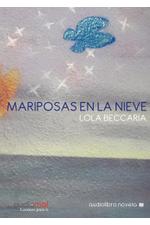 Mariposas en la nieve es la cuarta novela de la escritora española Lola Beccaria. Publicada inicialmente por la editorial Anagrama en 2006, hoy te la ofrecemos a través de nuestra plataforma de descarga de audiolibros y videocuentos, donde tienes a tu disposición cientos de títulos para todos los gustos.
Mariposas en la nieve es la cuarta novela de la escritora española Lola Beccaria. Publicada inicialmente por la editorial Anagrama en 2006, hoy te la ofrecemos a través de nuestra plataforma de descarga de audiolibros y videocuentos, donde tienes a tu disposición cientos de títulos para todos los gustos.
Mariposas en la nieve es una novela llena de símbolos y de misterio, de lirismo y también de nostalgia, porque nos habla de esa difícil tarea que resulta ser para todos dejar de ser niños y crecer para convertirse en adultos.
La protagonista de esta historia, una joven pianista, se pierde por carreteras secundarias que la llevan a un misterioso pueblo en la sierra, habitado por niños tristes con padres convencionales que son incapaces de comunicarse con ellos.
Pero allí vive también una niña diferente, una niña libre que juega con alegría y que nos hace reflexionar sobre si es necesario renunciar a nuestros sueños para llegar a ser alguien en la vida o si, precisamente por esa renuncia, acabaremos por ser alguien que nada tenga que ver con nosotros mismos.
Ya sabes, para escucharlo, solo necesitas tu carné de usuario y tu contraseña.
Mariposas en la nieve is the fourth novel by Spanish writer Lola Beccaria . First published by Anagrama Publishing House, in 2006, now we offer it to you through our audiobooks and video-tales platform , where you can find hundreds of titles to suit all tastes .
Mariposas en la nieve is a novel full of symbols and mystery, lyricism and nostalgia , because it tells us about the difficult task of becoming and adult.
The protagonist of this story , a young pianist, gets lost in a secondary road that leads to a mysterious village in the mountains, inhabited by sad children with conventional parents who are unable to communicate with them.
But there also lives a different girl, a girl full of joy who makes us to consider whether it is necessary to give up our dreams to become a grown-up.
To enjoy this novel, you just need your library card and your password. Happy weekend!
